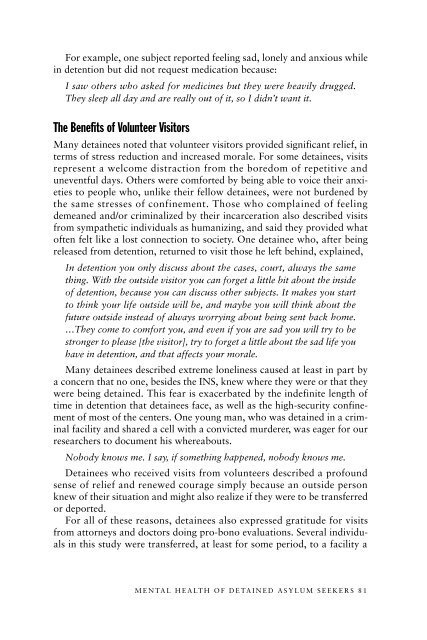From Persecution to Prison - Bellevue/NYU Program for Survivors of ...
From Persecution to Prison - Bellevue/NYU Program for Survivors of ...
From Persecution to Prison - Bellevue/NYU Program for Survivors of ...
You also want an ePaper? Increase the reach of your titles
YUMPU automatically turns print PDFs into web optimized ePapers that Google loves.
For example, one subject reported feeling sad, lonely and anxious whilein detention but did not request medication because:I saw others who asked <strong>for</strong> medicines but they were heavily drugged.They sleep all day and are really out <strong>of</strong> it, so I didn’t want it.The Benefits <strong>of</strong> Volunteer Visi<strong>to</strong>rsMany detainees noted that volunteer visi<strong>to</strong>rs provided significant relief, interms <strong>of</strong> stress reduction and increased morale. For some detainees, visitsrepresent a welcome distraction from the boredom <strong>of</strong> repetitive anduneventful days. Others were com<strong>for</strong>ted by being able <strong>to</strong> voice their anxieties<strong>to</strong> people who, unlike their fellow detainees, were not burdened bythe same stresses <strong>of</strong> confinement. Those who complained <strong>of</strong> feelingdemeaned and/or criminalized by their incarceration also described visitsfrom sympathetic individuals as humanizing, and said they provided wha<strong>to</strong>ften felt like a lost connection <strong>to</strong> society. One detainee who, after beingreleased from detention, returned <strong>to</strong> visit those he left behind, explained,In detention you only discuss about the cases, court, always the samething. With the outside visi<strong>to</strong>r you can <strong>for</strong>get a little bit about the inside<strong>of</strong> detention, because you can discuss other subjects. It makes you start<strong>to</strong> think your life outside will be, and maybe you will think about thefuture outside instead <strong>of</strong> always worrying about being sent back home.…They come <strong>to</strong> com<strong>for</strong>t you, and even if you are sad you will try <strong>to</strong> bestronger <strong>to</strong> please [the visi<strong>to</strong>r], try <strong>to</strong> <strong>for</strong>get a little about the sad life youhave in detention, and that affects your morale.Many detainees described extreme loneliness caused at least in part bya concern that no one, besides the INS, knew where they were or that theywere being detained. This fear is exacerbated by the indefinite length <strong>of</strong>time in detention that detainees face, as well as the high-security confinemen<strong>to</strong>f most <strong>of</strong> the centers. One young man, who was detained in a criminalfacility and shared a cell with a convicted murderer, was eager <strong>for</strong> ourresearchers <strong>to</strong> document his whereabouts.Nobody knows me. I say, if something happened, nobody knows me.Detainees who received visits from volunteers described a pr<strong>of</strong>oundsense <strong>of</strong> relief and renewed courage simply because an outside personknew <strong>of</strong> their situation and might also realize if they were <strong>to</strong> be transferredor deported.For all <strong>of</strong> these reasons, detainees also expressed gratitude <strong>for</strong> visitsfrom at<strong>to</strong>rneys and doc<strong>to</strong>rs doing pro-bono evaluations. Several individualsin this study were transferred, at least <strong>for</strong> some period, <strong>to</strong> a facility aMENTAL HEALTH OF DETAINED ASYLUM SEEKERS 81



